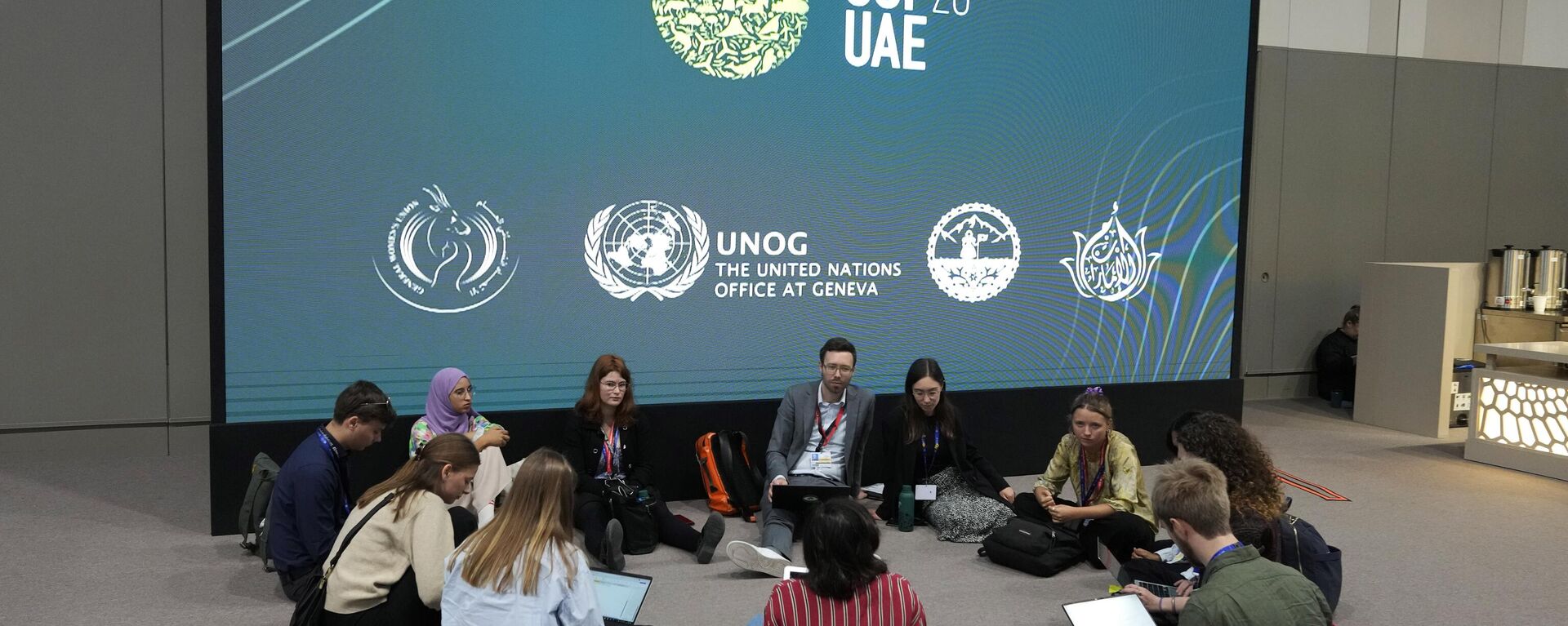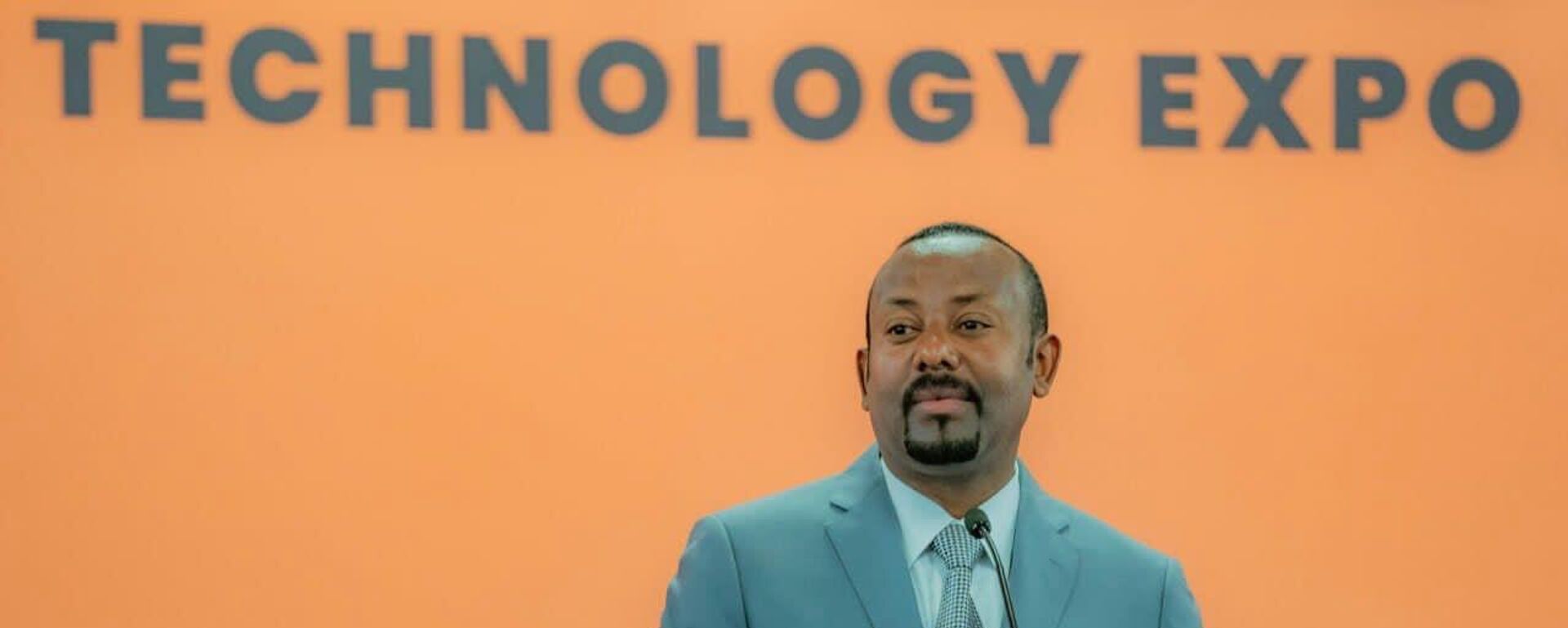https://en.sputniknews.africa/20231215/a-total-failure-cop28-outcomes-explored-through-african-lens-1064128106.html
'A Total Failure'? COP28 Outcomes Explored Through African Lens
'A Total Failure'? COP28 Outcomes Explored Through African Lens
Sputnik Africa
As the UN Climate Change Conference, COP28, recently concluded in the United Arab Emirates, Sputnik Africa spoke to an African activist about the summit's... 15.12.2023, Sputnik Africa
2023-12-15T12:16+0100
2023-12-15T12:16+0100
2023-12-15T17:46+0100
opinion
africa insight
united arab emirates (uae)
brics
climate change
climate
environment
cop28 in uae
finance
west
https://cdn1.img.sputniknews.africa/img/07e7/0c/0f/1064127937_0:161:3071:1888_1920x0_80_0_0_2dbec1fc392528ef8b42cb45f5c1a9b3.jpg
COP28 was unsuccessful for African countries, as countries in the Global North failed to commit to meeting the $100 billion in climate finance pledged to help developing countries reduce emissions and adapt to global warming, Sydney Chisi, Executive Director at Reyna Trust in Zimbabwe, told Sputnik Africa.At COP15 in Copenhagen, Denmark, in 2009, developed countries pledged $100 billion a year to help developing countries, including African nations, fight climate change, but the money has not materialized.The activist noted that new climate finance mechanisms need to be put in place for Africa and the Global South in general, who are beginning to run out of hope for the promised funds.In addition, Chisi noted that at the center of the climate negotiations are private companies, big polluters, who "will not negotiate on behalf of vulnerable communities," because they have no money to lobby, but will discuss issues from a profit and business perspective.Chisi also addressed the Loss and Damage Fund, which was officially launched during COP28 with $700 million in donations, mostly from Western countries. He noted that "it is very difficult for Africa to rely on these funds," highlighting concerns about the lack of a clear definition of vulnerability status and potential political and economic barriers to access.The climate activist explained the shortcomings of the fund, that many African countries will not see the money due to their debt status, and that the fund is under the World Bank, which usually manages loans rather than grants.In addition, according to the pundit, the promised funding under the Loss and Damage Fund is not enough for Africa in the context of the climate challenges facing the continent.The activist criticized the 2015 Paris Climate Agreement, which covers climate change mitigation, adaptation, and finance, noting that while it is "a very good document" on paper, it is not legally binding and does not mandate the distribution of pledged funds to developing countries.Chisi also mentioned alternative perspectives, exploring the joint declaration by the BRICS bloc advocating for a multilateral response to climate change. He mused on the potential of BRICS collaboration, asserting that "BRICS is an alternative to the neoliberal agenda set by neo-colonialism and the capitalist world," while emphasizing the need for institutions like the New Development Bank to support climate action.COP28 was held in Dubai, UAE, from November 30 to December 12, and brought together world leaders, global organizations and stakeholders to negotiate and collaborate to fight the climate crisis.
https://en.sputniknews.africa/20231210/african-delegations-lament-slow-progress-in-cop28-talks-on-climate-adaptation-funding-1064050624.html
https://en.sputniknews.africa/20231202/debt-ridden-countries-cant-fight-climate-change-ethiopias-prime-minister-tells-cop28-1063914381.html
united arab emirates (uae)
west
Sputnik Africa
feedback@sputniknews.com
+74956456601
MIA „Rossiya Segodnya“
2023
Maxim Grishenkin
https://cdn1.img.sputniknews.africa/img/07e7/0a/17/1063018107_0:0:1104:1103_100x100_80_0_0_03090c85a11f5d2e8a19cf1d989443c9.jpg
Maxim Grishenkin
https://cdn1.img.sputniknews.africa/img/07e7/0a/17/1063018107_0:0:1104:1103_100x100_80_0_0_03090c85a11f5d2e8a19cf1d989443c9.jpg
News
en_EN
Sputnik Africa
feedback@sputniknews.com
+74956456601
MIA „Rossiya Segodnya“
Sputnik Africa
feedback@sputniknews.com
+74956456601
MIA „Rossiya Segodnya“
Maxim Grishenkin
https://cdn1.img.sputniknews.africa/img/07e7/0a/17/1063018107_0:0:1104:1103_100x100_80_0_0_03090c85a11f5d2e8a19cf1d989443c9.jpg
africa insight, united arab emirates (uae), brics, climate change, climate, environment, cop28 in uae, finance, west, economy
africa insight, united arab emirates (uae), brics, climate change, climate, environment, cop28 in uae, finance, west, economy
'A Total Failure'? COP28 Outcomes Explored Through African Lens
12:16 15.12.2023 (Updated: 17:46 15.12.2023) As the UN Climate Change Conference, COP28, recently concluded in the United Arab Emirates, Sputnik Africa spoke to an African activist about the summit's impact on the continent in terms of its contribution to the pressing issues surrounding the fight against climate change and the much-needed funding.
COP28 was unsuccessful for African countries, as countries in the Global North failed to commit to meeting the $100 billion in climate finance pledged to help developing countries reduce emissions and adapt to global warming, Sydney Chisi, Executive Director at Reyna Trust in Zimbabwe, told Sputnik Africa.
At COP15 in Copenhagen, Denmark, in 2009, developed countries pledged $100 billion a year to help developing countries, including African nations, fight climate change, but the money has not materialized.
"So at the end of the day, when it comes to issues of climate finance, COP28 was, once again, a total failure for Africa and there's absolutely no hope for Africa to get that money from the Global North," Chisi pointed out.
The activist noted that new climate finance mechanisms need to be put in place for Africa and the Global South in general, who are beginning to run out of hope for the promised funds.
In addition, Chisi noted that at the center of the climate negotiations are private companies, big polluters, who "will not negotiate on behalf of vulnerable communities," because they have no money to lobby, but will discuss issues from a profit and business perspective.
"If you look at COP28, this time around, you can actually see that the way more oil lobbyists that were present at COP28, if you look at the behavior of the OPEC countries who are refusing on phasing out of fossil fuels and almost winning that debate, it begins to tell you that poor African countries will never have a strong negotiating by gaining power against those who got money," he stressed.
Chisi also addressed the Loss and Damage Fund, which was officially launched during COP28 with $700 million in donations, mostly from Western countries. He noted that "it is very difficult for Africa to rely on these funds," highlighting concerns about the lack of a clear definition of vulnerability status and potential political and economic barriers to access.
The climate activist explained the shortcomings of the fund, that many African countries will not see the money due to their debt status, and that the fund is under the
World Bank, which usually manages loans rather than grants.
In addition, according to the pundit, the promised funding under the Loss and Damage Fund is not enough for Africa in the context of the climate challenges facing the continent.
"For Africa, even though we have got 700 million that has been pledged so far, which is only 0.2% of what we expected, it's very little money considering the climate crisis that has been affecting Africa," he opined. "If you look at the drought in the Horn of Africa, the droughts that are likely going to happen in southern Africa because of the El Nino phenomena and the challenges within the Sahel region, so that money in itself is not enough in Africa will struggle to get hold of that money."
The activist criticized the 2015 Paris Climate Agreement, which covers
climate change mitigation, adaptation, and finance, noting that while it is "a very good document" on paper, it is not legally binding and does not mandate the distribution of pledged funds to developing countries.
"[The] Paris Agreement in itself, does not force anyone to release that money and it is the weakness that even though we can identify the enemy within the climate change discourse, we cannot put that enemy to account and uphold responsibilities to ensure that money comes down to the Global South," he said.
Chisi also mentioned alternative perspectives, exploring the joint declaration by the BRICS bloc advocating for a multilateral response to climate change. He mused on the potential of BRICS collaboration, asserting that "BRICS is an alternative to the neoliberal agenda set by neo-colonialism and the capitalist world," while emphasizing the need for institutions like the New Development Bank to support climate action.
In this vein, the activist concluded by saying that the BRICS bloc should promote the participation of African countries to move away from fossil fuels and begin funding new renewable and green energy initiatives to prevent climate disasters in Africa.
COP28
was held in Dubai, UAE, from November 30 to December 12, and brought together world leaders, global organizations and stakeholders to negotiate and collaborate to fight the climate crisis.




